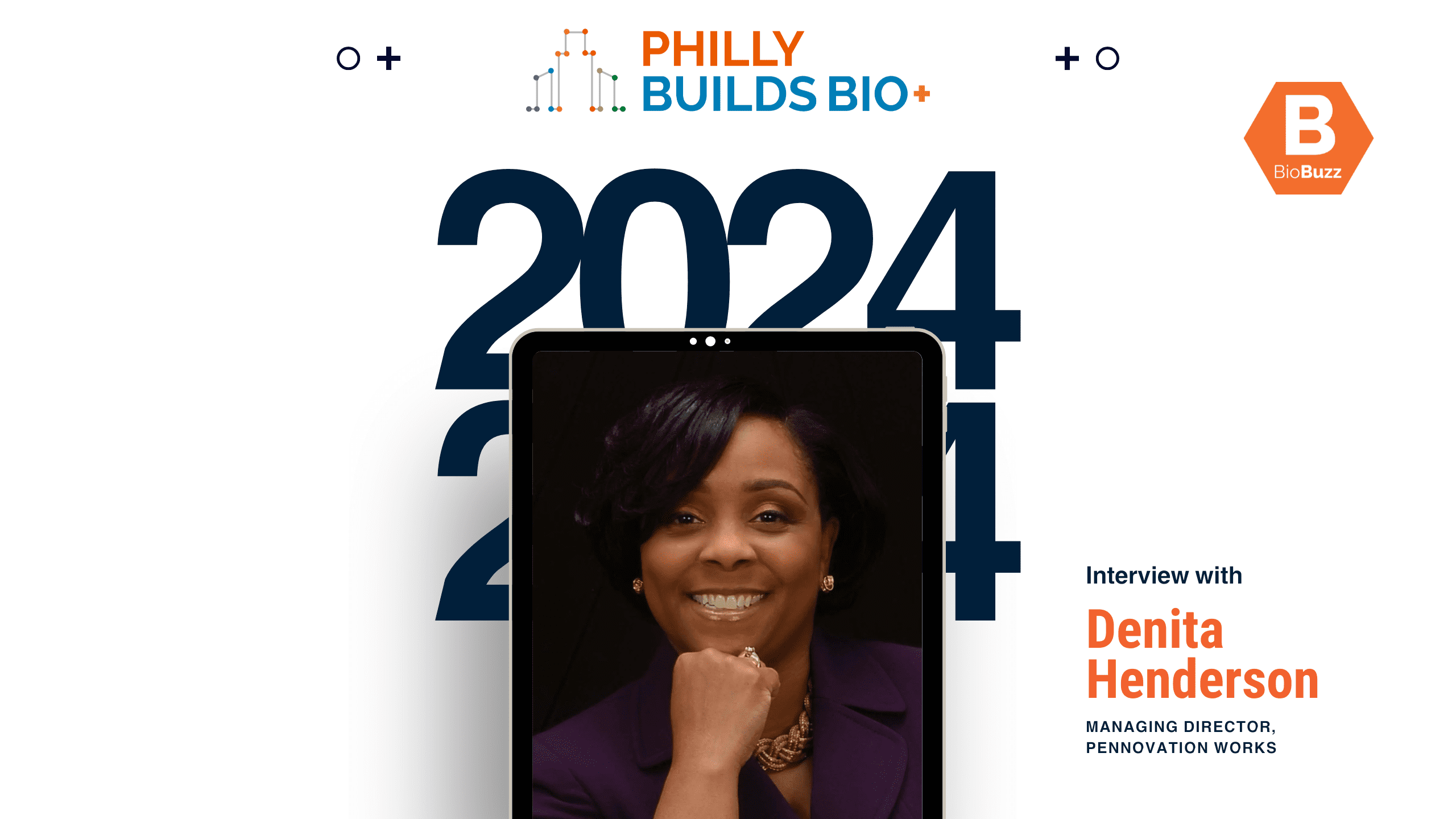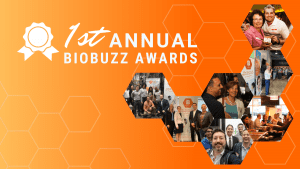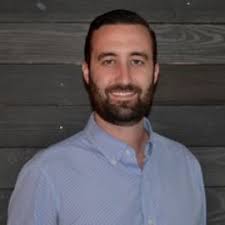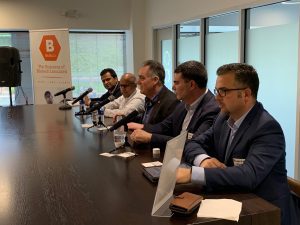
In Conversation with Denita Henderson, Managing Director, Pennovation Works
At the Philly Builds Bio 3rd Annual Symposium, Chris Frew of BioBuzz interviewed Denita Henderson, Managing Director of Pennovation Works, where she discussed her role in guiding the 23-acre innovation community adjacent to Penn’s West Philadelphia campus. With over twenty years of experience in real estate, economic development, and community advancement, Denita focuses on strategic planning, business development, and fostering an ecosystem of innovation and entrepreneurship within the life sciences and technology industries.
November 14, 2024
| This article is part of our In Conversation series, one of our ongoing People & Places Features. Go indepth with some of the most interesting people making impact across BioBuzz’s growing biohubs. |
Chris Frew [00:00:05]:
Welcome. My name is Chris Frew, CEO of BioBuzz Networks. We’re here today in Philadelphia at the 3rd Annual Philly Builds Bio, its symposium for life sciences. We’re here joined by over 100 different guests and over 50 different panelists talking about life science innovation right here in Philadelphia. And I’m very excited to be joined by Danita Henderson today. Welcome.
Denita Henderson [00:00:26]:
Thank you.
Chris Frew [00:00:27]:
Would you take a quick minute and give an introduction to the audience?
Denita Henderson [00:00:30]:
Sure. As you mentioned, I’m Denita Henderson and I’m the managing director at Pennovation Works. Pennovation Works is actually the University of Pennsylvania’s 23-acre technology park. And that’s the place where ideas go to work. We’ll talk more about that.
Chris Frew [00:00:47]:
I love that. Where ideas go to work. That’s exciting. So I guess let’s just start from the beginning. Tell us, give us a little bit of the history of how Pennovation got started and really kind of what your mission is.
Denita Henderson [00:01:00]:
Okay. So I’m actually part of the facilities and real estate services unit at Pennsylvania. And you may say, how does real estate come together with innovation? We like to say that we use real estate to enable innovation. So when a 23-acre plot becomes available near your main campus, it piques your interest. And so Penn was able to acquire the site and start re envisioning what innovation could look like at the university. And so the real estate division partnered with our technology transfer office, which is now known as the Penn center for Innovation, and started master planning this 23-acre site. The first installation was the Pennovation center and that’s where we house about 40,000 square feet of incubator space for early stage startups. We then went on to open another building on the complex with some more dry labs office space. And then the big finale so far has been our Pennovation lab building, which is another almost 60 over 60,000 square feet of wet lab space for businesses to graduate from the incubator into private labs. And so that’s kind of the trajectory and chronology of how innovation works came to be.
Chris Frew [00:02:25]:
That’s exciting. That sounds like whoever had that idea really put it to work.
Denita Henderson [00:02:29]:
Yes, yes.
Chris Frew [00:02:32]:
So what are some of the things that you do to help support those innovators and those ideas? What are some of the systems and support that you provide?
Denita Henderson [00:02:40]:
Right. In addition to providing the, I guess, state of the art facilities, we make sure that the facilities are equipped with state of the art equipment. So in the early stages, businesses need to share equipment, maybe share labs, because they’re not at the place where they can invest independently yet. So we make those investments and then help businesses along their journey towards full commercialization and capitalization. And so we do that with a few types of buckets of programs, if you will. We have an experienced management team that makes sure that all of the members in our community are well connected, well connected to other innovators and throughout the ecosystem. And then we have an education and entrepreneurship team or our E2 team. And their job is to make sure that for each company that’s coming into our community that we’ve laid out very specific resources that they can access, we’ve made those connections, we’ve put the right training in place for them, we’ve made the right types of investor connections and prepared them to approach investors. And so when you think about it, it really is like a 360 approach to make sure that our members are healthy, that they’re whole, and that their journey toward commercial success is well supported.
Chris Frew [00:04:10]:
That’s amazing. I mean, it does take a village to move these companies. So are all the members spin outs of UPenn or are other companies able to come and get space there?
Denita Henderson [00:04:24]:
That’s a great question. Most people think it’s just for pen spin outs, innovation, but it is not. We actually have companies from all over the region. Of course, a number of Penn spin out to locate there, but then again we have companies that may have formed from Drexel, from Temple or just from the private sector. And so we’re just pretty much a melting pot, if you will, of all kinds of innovation companies that have their starting point throughout the regional ecosystem. So we’re excited to be able to bring our asset to the entire region.
Chris Frew [00:04:57]:
That’s really good to know. You mentioned that you have staff that are actually helping to just make connections for your members. How important is community for these early companies? And how would you talk about the Philadelphia life sciences community?
Denita Henderson [00:05:14]:
Okay, so one, I’ll talk about it in terms of innovation. So if you think about the life of a founder, it can be very lonely. In some cases you have this idea, you’re not sure maybe if it’s going to work, if you’re going to have enough support financially or with the right staff. And so when you put innovators in a community with other like minded innovators that are experiencing the same challenges, it just builds, I guess, a sense of confidence and belonging that kind of makes the journey a little bit easier for everyone. So we are very intentional about curating our community to make sure that the connections make sense for Everybody, we’re interdisciplinary, so a lot of times in our community we can maybe connect you with someone outside of your vertical so you start to think outside of the box. And so we’re very intentional about how we put this community together. And then the last piece of that is connecting our community to the broader ecosystem so that again, you’re not on an island, you’re part of a broad community that has the support, that has the answer somewhere. If we’re really targeted in our approach about extracting the resources and information they need, that’s great.
Chris Frew [00:06:26]:
Yeah, the community. Well, we’re here today at the Philly builds biosymposium, which is a really kind of like a cross cutting of what the community looks like here. And there’s just a tremendous amount of resources we’re seeing today.
Denita Henderson [00:06:38]:
Yes. One of the things we’re particularly proud about is that Pennovation is almost like Penn’s innovation extension arm. If you think about all of the great innovation coming out of the university and all the resources that helped enable that, Pennovation sits at a place where we can pull those resources out of the university and kind of deploy them region wide. So whether it’s a resource like our Mac Institute for Entrepreneurship that comes out of Wharton or the Snider Consulting Group that also works with some of the startups that come out of Penn, we’re able to bring those resources out into the community and you know, bring Penn to the community and bring the community into Penn. So we’re excited about that.
Chris Frew [00:07:26]:
I love that. You know, the headline news you often see is when there’s like a tech transfer that comes out of a university.
Denita Henderson [00:07:33]:
Right.
Chris Frew [00:07:34]:
But what you’re talking about is like know how and programming and commitment. And I think that’s just another area that I’m hearing from you, that that Penn is really contributing into the ecosystem.
Denita Henderson [00:07:45]:
Yes. So I like that the word is tech transfer because a lot of times you think, oh, it’s just licensing. You get your technology out, give it to a corporation, they license it, you transfer that technology. But we’re also transferring, if you will, the technical expertise so that the broader community benefits from the homegrown talent that Penn has to offer.
Chris Frew [00:08:06]:
That’s great. Tell me Denita, what are some of the things that you’re excited about that you and your team are doing right now?
Denita Henderson [00:08:15]:
Okay, so we have a robust offering in suite of programs. So for instance, every summer we do a summer accelerator. It’s a six week program where we bring upwards of a dozen teams onto campus, onto the complex and do some very rapid fire kind of business development work with them. And then it culminates in a pitch competition. So they win, you know, the winner wins and then the other members of the cohort get to stay on and become part of our community. So that’s one exciting program we have is I get to meet new people and they, you know, they’re coming from all different parts of our ecosystem. Another fun thing that we do is something called warm intros. And so warm intros gives us a chance to bring in some key players in our network, whether it’s investors or some folks who may have expertise or connections for corporate relations. And so we bring those folks in and do really warm introductions for our members in our community so that they start to again, really build strong relationships that can help with their journey.
Chris Frew [00:09:26]:
Yeah, I keep coming to what I hear from is it’s just programming, but relationships and connectivity that you’re fostering there.
Denita Henderson [00:09:35]:
Yes.
Chris Frew [00:09:36]:
Do you have any success stories that you’re really proud of that you can share?
Denita Henderson [00:09:41]:
Yes. So we have success stories kind of across the gamut, whether it’s some small successes for companies that are still in their very early stage. So one of our successes is a company named Sahay AI. And why I’m pointing them out is because here’s a company that was founded as a spin out of another company in our ecosystem. So one of our founders had an employee who said, hey, I have an idea, you know, can we also have space and try to start our program? We said, sure. He said, well, I don’t have a lot of money, you know, what can I do? He was already a member of our community, so we put him into a new pilot program called Ramp up. And we gave him really low cost space and then gave him access to mentorship, gave him a seat in the summer accelerator where he applied and earned it, and then just a number of other resources. And when I tell you this young entrepreneur has taken advantage of every single opportunity that we’ve given him. He actually won the pitch competition this year and beat out a few other companies. He’s really the poster child for how you can grow a company when you take advantage of everything that’s been presented to you. And then at the other end of the spectrum, there’s companies like, there are companies like interiors biotherapeutics who started at one bench and now has about 40,000 square feet of space at our complex with dozens of employees and is entering clinical trials with some very healthy funding streams in place to support their growth.
Chris Frew [00:11:20]:
That is really exciting and two good stories to be very proud of. I can’t think of a better way to wrap things up and, you know, really showcase how you’re putting ideas to work.
Denita Henderson [00:11:30]:
Yes. Well, thank you, Chris.
Chris Frew [00:11:32]:
Thank you for your time. My name is Chris Frew with Biobuzz Networks. We’re here live today at Philly Builds Bio. Thank you.
- About the Author
- Latest Posts
BioBuzz is a community led, experience focused, biotech and life sciences media and events company. BioBuzz highlights regional breaking news, industry professionals, jobs, events, and resources for business and career growth. Their weekly newsletter is subscribed to by thousands in the BioHealth Capital Region and Greater Philadelphia as the go-to for industry updates.





